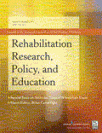
College Graduation to Employment in STEM Careers: The Experience of New Graduates at the Intersection of Underrepresented Racial/Ethnic Minority Status and Disability
Purpose: To examine the recent labor market indicators of science, technology, engineering, and mathematics (STEM) versus non-STEM college graduates with disabilities.
Method: The sample included bachelor of science (B.S.)/B.S.-level college graduates including 1,567,527 with a disability and 32,512,446 without a disability. Data were derived from the American Community Survey public use microdata files 2009–2011 inclusive. Three measures of labor market activity were used: labor force participation rate, unemployment ratio, and employment-to-population ratio.
Results: Nonparametric tests of proportion with stringent alpha levels indicated that overall labor market participation was much lower for graduates with disabilities. Indicators improved somewhat for STEM graduates with disabilities perhaps because they persisted longer in their job search efforts. Within the sample of STEM graduates with disabilities, Whites experienced greater labor market participation than ethnic minorities. It was also found that supply-side interventions to improve STEM employment (i.e., government investment) have been markedly less effective than demand-side interventions (i.e., expanded recruitment of foreign STEM degree holders).
Conclusion: Recent labor economics data and the expanded recruitment of foreign STEM degree holders bring into question whether or not a true STEM crisis exists today.
Method: The sample included bachelor of science (B.S.)/B.S.-level college graduates including 1,567,527 with a disability and 32,512,446 without a disability. Data were derived from the American Community Survey public use microdata files 2009–2011 inclusive. Three measures of labor market activity were used: labor force participation rate, unemployment ratio, and employment-to-population ratio.
Results: Nonparametric tests of proportion with stringent alpha levels indicated that overall labor market participation was much lower for graduates with disabilities. Indicators improved somewhat for STEM graduates with disabilities perhaps because they persisted longer in their job search efforts. Within the sample of STEM graduates with disabilities, Whites experienced greater labor market participation than ethnic minorities. It was also found that supply-side interventions to improve STEM employment (i.e., government investment) have been markedly less effective than demand-side interventions (i.e., expanded recruitment of foreign STEM degree holders).
Conclusion: Recent labor economics data and the expanded recruitment of foreign STEM degree holders bring into question whether or not a true STEM crisis exists today.
Document Type: Research Article
Publication date: 01 August 2014
- Rehabilitation Research, Policy, and Education is no longer available to subscribers on Ingenta Connect. Please go to http://connect.springerpub.com/content/sgrrrpe to access your online subscription to Rehabilitation Research, Policy, and Education.
- Access Key
- Free content
- Partial Free content
- New content
- Open access content
- Partial Open access content
- Subscribed content
- Partial Subscribed content
- Free trial content